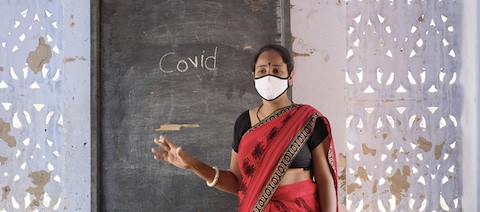
GCED Basic Search Form
Quick Search
현재 위치
뉴스

A successful education recovery hinges on increased investment in the well-being, training, professional development and working conditions of the world’s 71 million teachers to recover learning losses and manage transformations in teaching and learning imposed by the COVID-19 pandemic.
This is the key message of World Teachers’ Day, celebrated on 5 October under the slogan “Teachers at the heart of education recovery.” The global advocacy day calls on governments and the international community to focus on teachers and the challenges facing their profession, and to share effective and promising policy responses.
“Today we celebrate the exceptional dedication and courage of all teachers, their capacity to adapt and to innovate under very challenging and uncertain conditions. They are the principal actors of the global education recovery efforts and are key in accelerating progress towards inclusive and equitable quality education for every learner, in every circumstance,” said the conveners of World Teachers’ Day, UNESCO’s Director-General, Audrey Azoulay, UNICEF’s Executive Director, Henrietta Fore, International Labour Organization’s Director-General, Guy Ryder, and Education International’s General-Secretary, David Edwards in a joint statement.
“Now is the time to recognize the exceptional role teachers play and to empower them with the training, professional development, support and working conditions they need to deploy their talent. Education recovery will be successful if it is conducted hand in hand with teachers - giving them voice and space to participate in decision-making,” argued the conveners.
The educational disruptions caused by the COVID-19 crisis highlighted the crucial role of teachers in maintaining learning continuity. They have been at the heart of the educational response, from leveraging technology creatively to providing socio-emotional support to their students and reaching those most at risk of falling behind with take-home packages.
But the crisis has also highlighted major challenges facing the teaching profession, including the lack of career development opportunities in online teaching and distance learning, increased workloads associated with double-shift classes and blended models and occupational safety issues.
As of 27 September, schools opened fully in 124 countries. They are partially reopened in 44 countries and fully closed in 16. These figures highlight both the need for attention to teachers’ health and well-being as schools reopen, and for continued professional development to integrate and use educational technologies.
According to UNESCO’s research 71% of countries have given some priority to the vaccination of teachers, but only 19 countries included them in the first round of vaccinations, while 59 countries have not prioritized them in their roll-out plans.
More effort is needed to support teachers in the transition to remote and hybrid teaching. According to the 2021 global survey conducted by UNESCO/UNICEF/World Bank and OECD released in July:
- 40% of countries trained three quarters or more of teachers on distance learning methods and the effective use of technologies in 2020
- Only six out of ten countries provided teachers with professional development on psychosocial and emotional support
- Just over half of all countries (58%) provided teachers with content for remote learning, while 42% provided teachers with ICT tools and internet connections
Putting teachers at the heart of the education recovery will require increasing the size of the teacher workforce. According to the above survey, 31% of 103 countries recruited additional teachers for school reopening, but the global gap remains high. In total, 69 million more teachers are needed worldwide to ensure universal primary and secondary education by 2030 (SDG target 4.1) It is projected that sub-Saharan Africa will need to recruit 15 million primary and secondary teachers by 2030.
To celebrate 2021 World Teachers’ Day, the conveners, together with partners, including the World Bank, the Hamdan Foundation, the International Task Force on Teachers for Education 2030 (TTF), civil society organisations and members of the Global Education Coalition, will organize global and regional events and an advocacy campaign with the participation of the UNESCO Global Network of Learning Cities. The five-day series of events will include panel discussions, webinars and online training sessions to examine effective policies, evidence and innovative practices to provide the support teachers need for successful recovery, resilience-building and reimagining education in the post-pandemic world, and to advance SDG 4.
URL:
